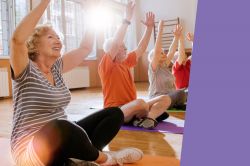Safely Ramping Up Activity in a Post-Pandemic World
April 14, 2021
Published by: CHI Living Communities

Modify your expectations (at least at first). Whether you want to either resume previous physical activities or begin new ones, remember to “walk before you run”! If you’ve been sedentary a lot during the pandemic, give yourself time to adjust to becoming more active. If you’ve been working out at home and try to jump back to where you used to be, you risk injury. Dial back, take it easy.
And, be sure to talk with your health care providing before resuming any exercise program to ensure it’s safe for you.
Other tips: start with balance.
- Wear good, sturdy shoes that support your feet. This is important, even if you’re not exercising, to help prevent falls.
- Stretch before and after a workout.
- Consider low-impact exercises--yoga, tai chi or swimming—or physical activities you enjoy, such as gardening, bowling or dancing.
- Stay hydrated! Drink plenty of water, or beverages enhanced with potassium and electrolytes.
- Listen to your body. Being very sore after activity is a sign that you overdid it. Allow a day or two of recovery time for your muscles if they do become sore.
- Get a good night’s sleep—at least seven or eight hours nightly.
- Consider exercises designed to improve your balance, such as water aerobics.
Proper strength-training for seniors can improve your muscle and bone mass, not to mention balance, and reduce the likelihood of falls, osteoporosis and hip fractures.
The most important exercises involve pushing, pulling, carrying, hinging at the hips and squatting. However, everyone’s physical abilities vary. That’s why it is very important to talk with your doctor about the best exercises for you before you ease back into action after the pandemic.
Links you may find useful:
- Exercises to improve your balance
- Strength training to improve muscle mass
- When to check with your doctor first
Staying fit pays lifelong dividends — so make sure you carefully invest in good health!
